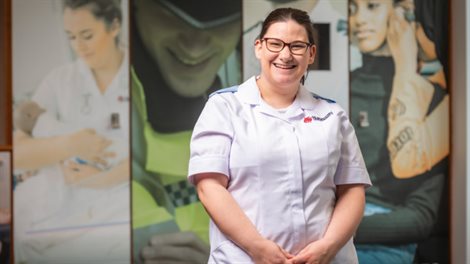Emma Hasman – Learning Disability Nursing student

Why did you choose Learning Disability Nursing at DMU?
I actually wanted to do teaching when I was younger, and I worked in a special needs school for 10 years. I come from a family of nurses and I did feel that pull but kept thinking it wasn’t for me. But when I started exploring the options, and saw Learning Disability Nursing at DMU, I knew that was the field I wanted to pursue.
I’m local to Leicester and I wanted to study somewhere close to home. I’ve had family members come here; my mum did her nursing training at DMU many years ago. I really like the fact that the Learning Disability class sizes are quite small, and I feel like I’m part of a tight community, a family even. I did look at other Uni’s on Open Days, but they just didn’t feel like home. Leicester is so diverse and multicultural; I’m meeting students from other countries and backgrounds and learning from them that DMU has a place for everyone.
What's your favourite aspect of your course?
Nothing beats going out and getting that real-life experience and putting theory into practise with the placements. You also get that contact with patients or residents and get to see first hand how your interventions, no matter how big or small, impacts their lives in a positive way. Its honestly the best part of the course!
I’ve been on a range of placements including with a community team that goes out to patients and does a lot of work around relationships or teaching patients skills for independence. I’ve also been placed in a residential setting which had a nursing team and gained experience supporting in personal care, supporting patients with shopping and learning how to manage money. For my next placement, I’m going to a prison and I’m really looking forward to the experience. It’s a completely different setting to what I have been working in with those who may have challenging behaviours or mental health disorders.
What inspired you to become a Learning Disability Nurse?
My sister has a rare condition called Williams Syndrome. She’s missing chromosome 7 and like any other learning disability, it’s a spectrum; some people are very independent and some need support. My sister lives in a home with specialised staff caring for her and supporting her with independent activities such as cooking, shopping and everyday things that we take for granted.
Learning disabilities have always been a part of my world. When she went into an in-patient facility, I remember one of the nurses saying, ‘Right, it’s our turn now to be the carers, you go home and be sister, mum and dad. We’ve got it from here’. Hearing that made me realise I do have a life outside of helping my sister and that the care nurses give often extends to their family as well, not just the patient.